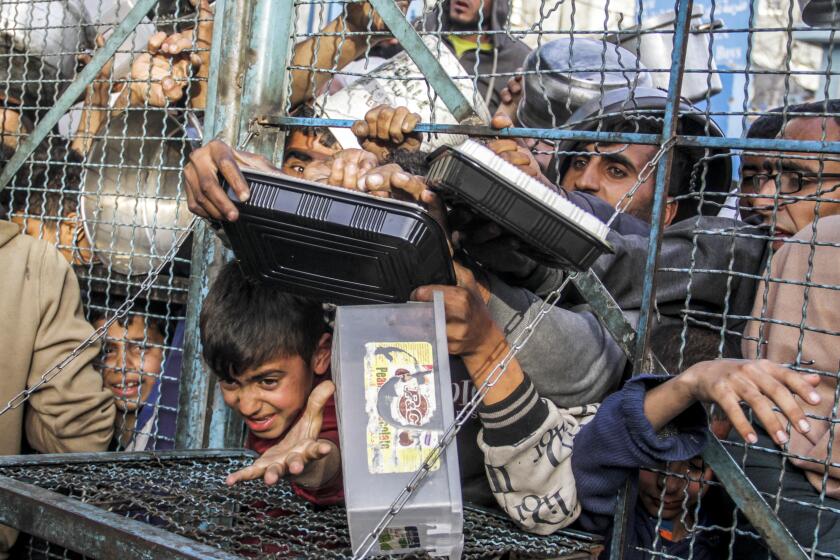Opinion: Israel is weaponizing hunger against Palestinians. Here’s how the U.S. can stop it

- Share via
As the U.N.’s leading independent expert on the right to food, I have watched with growing horror over the past 12 months as Israel has weaponized hunger against approximately 2.3 million Palestinians in the Gaza Strip.
Now, alarming reports have emerged indicating that Prime Minister Benjamin Netanyahu’s government is implementing a plan to starve hundreds of thousands of Palestinians in northern Gaza to force them to move south, treating anyone who stays behind as a legitimate target for the military. On Monday, Israel moved to ban the U.N.’s Palestinian refugee agency from operating in the occupied Palestinian territories, based on unsubstantiated claims that the organization has been infiltrated by militants. This is devastating news: The U.N. agency is people’s main lifeline in Gaza, and the ban would contravene international law.
In a report submitted to the U.N. General Assembly last month, I documented how Israel has used hunger as a tool of war in Gaza since Hamas’ attack on Oct. 7, 2023.
With warnings of ‘imminent’ famine in Gaza, there is a global push to get more aid to Palestinians amid the Israel-Hamas war. What are the roadblocks?
I consulted leading global famine experts, and their consensus is that since World War II, no population has been starved as quickly and as completely as the Palestinians in Gaza, nearly half of whom are children. Israel imposed severe restrictions on resources entering Gaza last October and, despite Israel’s denials, evidence shows it has since stymied multiple deliveries of food, water and medicine into the strip, violating its obligations under international humanitarian law. It has also attacked food and aid distribution sites, creating a climate of horror. As my colleagues and I announced in July, famine has struck all of Gaza.
This month Israel began another full siege on northern Gaza. It has since allowed only a small amount of aid to reach the north — a concession that followed recent pressure from the Biden administration. Humanitarian workers told me that Israel’s inspection and control of relief had been slow, opaque and baffling.
As appalling as it is in its own right, the restriction and denial of humanitarian aid is the tip of the iceberg. Over the past year, Israel has laid waste to Gaza’s food system, decimating bakeries, destroying and poisoning agricultural land, and wrecking ports and fishing vessels. The Israeli military has devastated approximately 93% of the local food economy, making it difficult — if not impossible — for Palestinians to feed themselves now and for the foreseeable future.
Even prior to Oct. 7, half of Palestinians in Gaza were already food insecure. Israeli restrictions on Gaza’s food system and borders, and the flow of people and goods, go back decades. Research indicates that the number of children who suffered from malnutrition doubled from 2000 to 2001 following a blockade by Israel. This situation worsened after Israel’s withdrawal of settlers in 2005 and imposition of a draconian siege and blockade in 2007. Since 2000, Israel’s military destroyed more than 10% of Gaza’s agricultural land, uprooted 226,000 trees and restricted access to the sea for fishing. Last year, after Israel began a food and water blockade on Oct. 9, Palestinians in Gaza made up 80% of the global population experiencing famine or catastrophic hunger by December.
Muslim and Arab American voters are among those upset by President Biden’s policy on Israel and the Middle East. But Donald Trump would be a disaster for Palestinians.
This month, Secretary of State Antony J. Blinken and Secretary of Defense Lloyd J. Austin III sent a letter to the Israeli government demanding it take measures within 30 days to improve humanitarian conditions in Gaza. Yet the Biden administration was alerted in April by its own humanitarian assistance authorities that Israel has deliberately blocked deliveries of food and medicine. It nevertheless continued to send financial and military support to Israel, potentially breaking U.S. law in the process.
Hungry Palestinians in Gaza cannot wait a few more weeks for food. President Biden must demand that Israel immediately allow the unrestricted entry of food and other humanitarian aid at land crossings to Gaza, making clear that if Israel does not comply, the U.S. will cut off weapons transfers.
As long as the U.S. and other Western governments continue to give money, weapons and diplomatic shielding, Israel has no incentive to change course. The only way for Americans to stop Israel’s starvation of the Palestinian people is to stop the flow of money and weapons enabling mass atrocity. Failure to do so will guarantee even more suffering and death for Palestinians in Gaza and compound the moral stain on the U.S. for its complicity.
Michael Fakhri is the United Nations special rapporteur on the right to food and professor at the University of Oregon School of Law.
More to Read
A cure for the common opinion
Get thought-provoking perspectives with our weekly newsletter.
You may occasionally receive promotional content from the Los Angeles Times.












